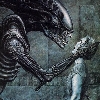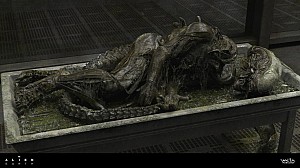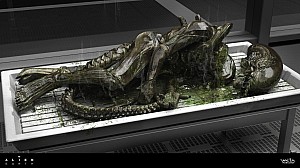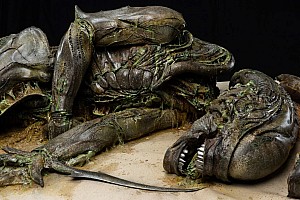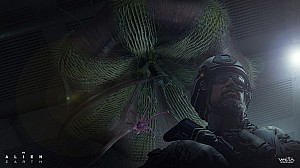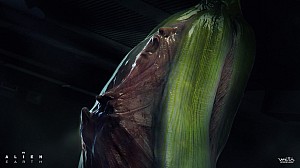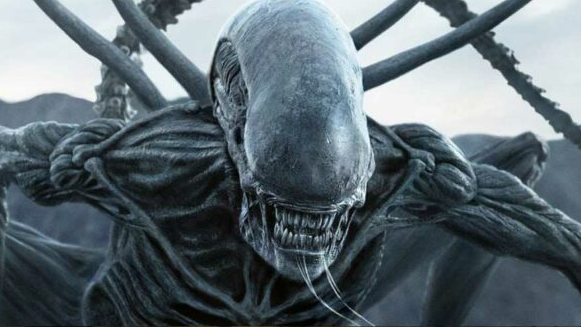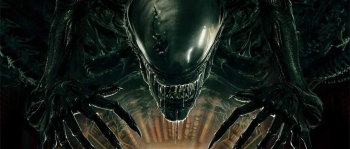Below are small snippets regarding the Alien movies from various interviews.
In an interview about 'Return of the Living Dead' DVD release O' Bannon makes comments on Alien and it's sequels.
Dan O'Bannon made an indelible mark on sci-fi and horror cinema with his script for the original ALIEN in 1979, and in the years since he has churned out several other notable genre screenplays and directorial efforts:

Dan O'Bannon
Alien (1979 seminal sci-fi horror):
"The one that was certainly best directed, far and away above the rest, was Alien. Ridley Scott's directorial thing there was absolutely wonderful. I haven't had another director equal it."
The Alien Sequels (1986, 1992 and 1997 follow-ups to Alien of which O'Bannon had no involvement):
"There was no practical reason for me to [really see them] because I wasn't involved with them and other than that I was wary about having my sensibilities upturned too many times. I saw the Cameron one and pieces of the other two. I mean, Alien was my picture and the other things, they've been grinding them out patiently. The only reason they're doing it is for the money. This is the classic franchise strategy that they now love so much which is just to keep beating a dead horse until it won't get up anymore. The Cameron one, he just about pulled it off. It was a separate movie in its own right. It was alright. It was O.K. [It's] a good answer to the problem which is how to sequelize this. Plus, he was very wise not to try to handle it as a fear-evoking horror suspense tale like the first one, because he's not good at that. And what he did was he'd do it all maybe a half hour at the beginning of the picture to try to create some of that atmosphere, and then he switched over to the gung-ho proactive mode in which Cameron can work very effectively. And so he was able to turn it to something he could work with to advantage. And you know, it was pretty good. I guess it was as good as sequels tend to be, better than most. It's hard for me to look at these things with objectivity, of course."
Veronica Cartwright interview, Starlog.
Her character suffered more than mere "hurt" in ALIEN. She finally reveals her originally planned demise and compares it with what made it to the screen. "From what I understand...," she begins, "remember when Yaphet Kotto gets killed? I was supposed to sneak along the wall and get into the locker -- the same one the cat was in earlier. The alien is supposed to track me down with his sensory things and I die of fright. Well, that's what they told me but the next thing is I'm hanging from a meat hook.

Veronica Cartwright
"All I can assume is: I got raped by the alien. Also, those were Harry Dean Stanton's legs. If you look at the movie he was wearing tennis shoes and blue pants. I was wearing white pants and cowboy boots. When I saw the actual screen version, I was very surprised.
"There were many things that were shot which aren't in the final movie. I thought events would take a different direction than they actually did in ALEIN. And that surprised me."
"It was very claustrophobic and we constantly deal with CO2 canisters. Those helmet things they had were also horrible. They were supposed to put a thing of oxygen in the helmet, but they forgot mine and I passed out -- that was really attractive. We all did."
Sigourney Weaver talks to The Big Issue in 2006.
Who can forget Sigourney Weaver as Ellen Ripley in the Alien films? A far cry from the computer geek fantasy of Lara Croft, she was cool, intelligent and tough, and most importantly, real. So iconic is Ripley that talk inevitably turns to the Alien films when I meet Weaver to discuss her latest movie, Snow Cake. Ironically, it is the one she did not appear in, the cross-franchise dud Alien Vs Predator, which dominates the conversation.

Sigourney Weaver
"It was because I heard about it that I wanted to die in the third one," she explains sharply. "I said, 'Just get rid of me, I don't want to be around.' And then they cloned me." Weaver appears rather pleased that the film flopped. "It kind of serves them right. I haven't seen it, but I have a feeling that the alien might not have even won. That's shocking."
At 56, the statuesque New Yorker looks like she could still play Ripley without embarrassment. Harrison Ford is returning as Indiana Jones. Has she thought about going into space again?
"I think the creature has been maxed out, especially after that awful movie. But the character, the situation in space..." Weaver pauses for a moment and then admits that she and Ridley Scott have talked about bringing Ripley back.
"It was a great character," she reflects, "and I was lucky because I got to play an active woman in real clothes instead of a little skimpy thing."
Sigourney Weaver unknown interview.
How has each of the Alien directors' conception of Ripley differed?
Ridley [Scott] and I were in similar positions -- he'd made one movie, The Duellists. And he cast me, this nothing, and he would do things like he'd suddenly grab me and say, "Look, I'm not giving you a fucking motivation to pick up your teacup!" And I'd go off and cry. And then he'd come over and say, "I'm so sorry, I wanted to say that to John Hurt but I didn't feel I could, so I thought if I said it to you he would hear me." There was something about Ridley's honesty and lack of bullshit that gave [Alien] so much authenticity.
[In that one] I felt that Ripley came from a family of people in the service. She was very by-the-book, and when all this chaos started there was nowhere for her to go but inside, into her instincts. And so her arc was really from this rigid young ensign to this survivor.
In [Aliens], Jim [Cameron] just wrote me this great part. I was so incredibly moved that he would take the character of Ripley and so enrich her, and give her such strong things to do. The whole idea of Ripley as a rebel -- the company disenfranchises her when she comes back. She's persona non grata, she's in rebellion against this system because she knows what they really are. He gave Ripley so much heart and so much integrity in a different way.
Of course, she had that minor love story, and in Alien3 the first thing David Fincher does is kill that whole story. He kills the little girl, takes the love interest, Michael Biehn, puts them both in the morgue. Ripley loses everything she had ever looked forward to having a normal life with. And then, of course, she discovers that she has [an alien] inside her. That to me is the most existential.
What were your concerns about doing a fourth Alien?
I heard they were doing Alien versus Predator. I wanted nothing to do with that. I was so proud of the three we'd done. The last thing I wanted to do was stick around on a series that was just going to be done to make more money.
They called you with a straight face and told you this idea? Or did they take you out to lunch?
No, they didn't dare take me to lunch. First of all, I was . . . the whole experience of Alien3 was so difficult. [The studio] hired David Fincher, they thought he was great, and as soon as he started working on the picture, they panicked. And I thought that was unforgivable, you know, to hire this brilliant young director and not give him any support.
But you agreed to a fourth.
Tom Rothman and Peter Chernin [at Fox] hired Joss Whedon [Buffy the Vampire Slayer] to do a script that I thought was remarkable. That's what seduced me. For one thing, I wasn't playing the same thing. And it was very intriguing to me to be brought back. Suddenly we're talking about a time where they could bring you back against your will.
In Alien3, Ripley kills herself, and in this one, she's cloned back from the dead. But she's not quite the same, is she?
[In Alien Resurrection] Ripley is part alien. She's not of either world. I feel she misses the alien world more, she's sort of stuck with the [humans], who seem ridiculous to her because they're always squabbling. She's from this landscape of death; if you have actually died, you have a very different outlook on survival. She's not intent on saving people. She's more of a nihilist. On the other hand, the animal in her would do anything to survive. It's almost as if the alien blood has made her so much more alive and more in her body. She's so strong, she's very sensual, she's very predatory, she has much more of a sense of humour, I think because she has died.
It sounds like a great part.
Great part. I'm glad I died. My husband had said, "You're so stupid, you died. This is the biggest franchise in the world and you died."
Weren't you the one who wanted Ripley to die?
At that point, I really wanted to do all these other things. It was perfect -- I got to go off and do other kinds of work and then come back to almost a new character.
In an interview with Charles S Dutton in one question, he briefly talks about how he got his role in Alien 3.

Charles S. Dutton
Q: Both you and Danny Glover have something in common- in that you've both taken on huge monsters. But while Danny’s beaten a Predator, you've been taken out by the creature in ALIEN 3 and a giant cockroach in MIMIC!
DUTTON: How I got ALIEN 3 was funny because I'd known Sigourney Weaver's husband Jim Simpson, who's a theatre and film director. We were at the Yale School of Drama together. And Sigourney saw me in a couple of Broadway plays over the years. So whenever I'd run into her, she'd say "When I do ALIEN 3, I'm going to get you a part in it." And I'd say "Yeah, yeah, right." Then a year or two would go by, and Sigourney would say the same thing again. Then lo and behold, Sigourney's people called when I was doing “The Piano Lesson” on Broadway. And they were asking me to come to London as soon as possible. So I really owe Sigourney a debt of gratitude, because she kept her word. And doing the film was a great experience. The only thing I was upset about was that the technology had gotten to the point where they didn't need the seven-foot guy in the monster suit anymore. They could do it all in cgi. So all the running and the scary parts were basically David Fincher saying, "The monster's coming down the hall. Get ready to run!" And I wanted to be chased by that seven-foot guy in the monster suit! That was the same case in MIMIC. But I had a great time playing both parts. Now when I catch ALIEN 3 on cable, I can see how it was different from the first two films. Yet I think it's just as good.
H. R Giger snippet from FEAR magazine December 1990.

H.R Giger
FEAR: You've used other sculptors to help realise your work in three dimensions : Peter Voysey on Alien and Cornelius De Vries on your furniture designs here in Switzerland. When you start on Alien 3, do you think that you will want to have the same team with whom you originally work?
Giger: I don't know. Most of the good people are not available and so I have to look at what's around. I like working with Cornelius De Vries. I don't know if he's quick as the film business demands because there it's terrible -- you have to go like crazy. it's always time. Cornelius and i, we've worked together for a long time and done several things. He could learn a lot, but I don't know if he's able to work under those conditions of pressure.
FEAR: Alien 3 is, naturally, still quite secret, and has been ongoing for several years with directors like Renny Harlin and Ridley Scott and writers such as William Gibson and Eric Red. You weren't invited to work on James Cameron's Aliens. What got you excited about doing this third part?
Giger: I don't like to talk about these things because sometimes I talk too much, and then it doesn't work out. I think that's what happened with me when I worked with Ridley Scott on this 'Train'. After five months, he finally said that he wouldn't be doing it, and so I was waiting the whole time for nothing and I was not paid. You know, I like Ridley Scott's work very much, and so I'm probably -- it sounds stupid -- a great admirer [laughs], otherwise I wouldn't have waited so long.
FEAR: This 'train' was some sort of tube station on earth wasn't it?
Giger: I did some designs when I heard Renny Harlin, but I wasn't told any of the story. I thought that the head of the Alien, that long head, could be like a train. Like the metro! I did some designs of this 'metro-as-an-alien', and I sent them to Twentieth Century Fox, but I never heard what they said about them.
FEAR: Do you have a real Alien here?
Giger: Yes. A real one! A Rambaldi -- Mechanical.
FEAR: The original design had worms inside its transparent head-cowling...
Giger: We tried to get it to work, but it was too hot and the worms kept falling asleep!
FEAR: Was Bolaji Badejo, the actor who played the Alien, easy to work with?
Giger: He was a very gentle man, and he had all the weight of this costume on him! It took so long to put him in the suit, it must have been really boring for him. I think it was a good decision not to show the Alien too much, because in 1978 when we were making the film, the special effects in England were not that good. The tail couldn't move properly! The head Rambaldi did was good, but the other things weren't. The whole thing was supposed to be translucent, but that didn't work. Now, of course, things are much more advanced.
FEAR: At the time of Alien, you said you liked to work with bones. Do you still?
Giger: Bones have very nice forms, especially if they are twisted a bit. Bones in combination with metallics, with tubes. It's like a cathedral. Like, Gaudi.
Clive Barker did an interview with David Huges about his talks with Fox at the idea of him writing and even directing Alien 3. This was featured in the UK Aliens comic: Vol 2: Issue #8
.jpg)
Clive Barker
ALIENS fans will doubtless be aware of the phenomenal Impact of Clive Barker on the horror scene a little more than 5 years ago, bringing with him such works as The books Of Blood, The Damnation Games and Hellraiser, the low-budget movie about Resurrection that in turn, helped to resurrect the independent horror movie. Not all fans of either Clive Barker or the ALIEN films will know, however, that Barker was one of the many film-makers approached by 20th Century Fox (who had distributed his most recent film Nightbreed) with an offer to write and direct the second of their ALIEN sequels, then working title ALIEN III.
In Britain late last year to promote his new children's books The thief of Always, and two films based on his work (Hellraiser III: Hell on Earth and Candyman) I asked him how he came to be attached (albeit briefly) to ALIEN III, and how he would have approached the film if he had accepted Fox's offer.
"I had several meetings with David (Giler) in London and L.A. talking about it." He tells me in the limousine that serves as a soundproof location for our interview . "But I could never get my head around the fact that the Aliens didn't seem terribly interesting to me. They're essentially machines, albeit organic ones. And that, he adds, referring to his penchant for creating extremely articulate (and often sympathetic) monsters, " is so very far from what I do. I just couldn't find my way around this warrior tribe of mute, instinct-led devourers; murderers," he admits, " but far too short a time."
Clive mentions meeting with Fincher and discussing the problems he had making ALIEN 3, and i ask Clive for his opinion of Fincher's starting, contentious, jury-is-still-out, second sequel. " I have two problems with the picture. The first is that so much emotional commitment is thrown out of the window because Micheal Biehn and Newt are dead from the beginning of the picture. I didn't want that to happen, i wanted continuity, and felt cheated by the fact that i had been asked to begin again. I didn't want to begin again.
" The second thing was that i didn't understand the meta physic of the piece. That is to say, all we have is this colony of bald monk prisoners with some pseudo-religion which we're not given any real insight into. The idea of them having no guns and gadgets was interesting, but that too was never really developed. So, I felt we were being teased with possibilities which were never then delivered.
" Actually," he adds, " I have a third objection, i don't think you can call a picture 'ALIEN Cubed' and show me one Alien. Given what we'd seen in the second picture - the mother Alien, caverns full of eggs, whole armies of these creatures - the threat seemed so... minuscule. I wanted the threat to be much more terrible than it was. "
Finally, I ask what else would Clive Barker have wanted from ALIEN 3? " Put it this way." he replies, " I'd have loved to have seen what Vincent Ward would have done with it."

David Giler: Cinefantastique Interview
David Giler, who wrote scripts for MYRA BRECKINRIDGE, THE PARALLAX VIEW and FUN WITH DICK AND JANE, always seemed to get his office located down the h...

David Giler Alien 3 Starburst Special Interview October 1992
Alien 3 screenwriter David Giler guides us on the terrifying journey from script to screen. Why was there a third Alien movie? What were all the re-wr...

Did Alien 3 rip-off The Element of Crime?
In 1984, Danish filmmaker Lars von Trier (Melancholia, Dogville) began his directorial career with The Element of Crime, his first feature film. ...


